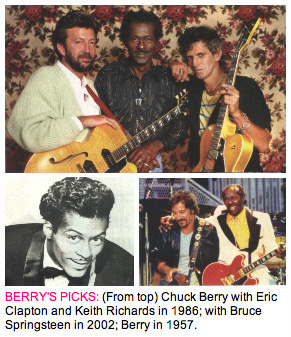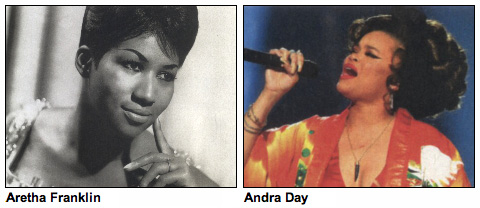![]()
| Chuck Berry - In Memoriam 1926-2017 |
|
![]()
Rock & roll icon Chuck Berry, who died from natural causes at 90 on March 18, was
one of the genre's founding fathers. His friend Joan Jett looks back on his legacy.
By Joan Jett as told to Kevin O'Donnell in Entertainment Weekly

![]() was introduced to Chuck Berry's music by my brother, who was a big rock & roll fan. What hit me as a kid is that he was saying something. On songs like 'School Days,' he told stories everyone can relate to. And his diction was incredible -- he wasn't mumbling -- so you could understand every word, which so many musicians don't tend to do. His stories were clear and honest and real. There's nothing to dig for. It's right there.
was introduced to Chuck Berry's music by my brother, who was a big rock & roll fan. What hit me as a kid is that he was saying something. On songs like 'School Days,' he told stories everyone can relate to. And his diction was incredible -- he wasn't mumbling -- so you could understand every word, which so many musicians don't tend to do. His stories were clear and honest and real. There's nothing to dig for. It's right there.
The way Chuck played guitar, he wrote the book on rock & roll: the bending of the two strings, making this hybrid of country and blues. He is rock & roll music. It wouldn't be here without him. From Chuck, you can hear it in all these other musicians, like Keith Richards. The lineage is just awesome.
 Kenny [Laguna, Jett's producer and collaborator] and I hung out with him at his house, Berry Park, once [in the 1980s]. He had his long hair and muttonchops and you're like, 'Damn, that's Chuck Berry!' It was surreal and incredible, just to go out there and be with him. He took us around his farm, showed us all his accolades, like those gold records. And he was so technologically advanced. He had big-screen TVs on the wall, before anyone saw big-screen TVs, and he'd watch MTV and music channels from all over the world.
Kenny [Laguna, Jett's producer and collaborator] and I hung out with him at his house, Berry Park, once [in the 1980s]. He had his long hair and muttonchops and you're like, 'Damn, that's Chuck Berry!' It was surreal and incredible, just to go out there and be with him. He took us around his farm, showed us all his accolades, like those gold records. And he was so technologically advanced. He had big-screen TVs on the wall, before anyone saw big-screen TVs, and he'd watch MTV and music channels from all over the world.
Later that day, we went out to eat at a diner. While he was driving, he banged into a motorcycle and just bumped it. He took out a hundred-dollar bill and gave it to the man and it was done. Then I guess he must have cut off a truck driver. So when we got to the diner, the driver came in and started yelling at us. Kenny and I, we're New Yorkers and don't mess around, so we wanted to get into it [with the truck driver]. But Chuck was like, 'Let it go.' It just shows you the kind of crap he had to put up with, with his fame.
The last time I spoke to him was on his birthday [in October]. I wanted to tell him that it was a pleasure to know him and have those experiences with him and that I appreciated his friendship and all he did for rock & roll. His music will absolutely live on and teach people for hundreds of years. You know how people say three-chord rock & roll [like Berry's] seems so boring right now? I'll tell you, if you play a three-chord rock & roll song and you play it right, there's no better music in the world." ![]()




 THE ESSENTIAL CHUCK BERRY
THE ESSENTIAL CHUCK BERRY 




|
"Maybelline" (1955) Berry's first smash was adapted from Bob Wills and His Texas Playboys' 1938 tune "Ida Red" -- but it's one of the first true rock & roll records. It's injected with a riot of the genre's touchstones: the honking guitar cadenza, the vamping vocal cadence, and a wild solo nicked by every guitarist since. |
"Wee Wee Hours" (1955) A top 10 hit, this showcases the nuances in Berry's vocals, equal parts longing and eroticism. |
"Brown Eyed Handsome Man" (1956) Berry slyly tapped into America's fears of interracial romance, treating the subject with subtlety, wit, and determination. "There's been a whole lot of good women shed a tear," he sings, "for a brown-eyed handsome man." |
"Roll Over Beethoven" (1956) This features one of the most irreverent salvos in pop history: "Roll over Beethoven/ Tell Tchaikovsky the news!" With that attitude and his volcanic guitar-playing, he didn't just advance rock & roll -- he kind of created punk. Berry said as much in a 1980 interview: "[Punk] ain't nothing I ain't heard before... The instruments may be different, but the experiment's the same." |
"You Can't Catch Me" (1956) This was so essential to rock's DNA, John Lennon lifted its lyrics and riff for the Beatles' 1969 anthem "Come Together." |
|
"Rock and Roll Music" (1957) The Magna Carta of rock, covered by everyone from the Beach Boys to the Beatles to Bill Haley and His Comets. |
"Johnny B. Goode" (1958) Simply one of the greatest rock & roll songs of all time -- with one of the most quoted guitar riffs. |
"Sweet Little Sixteen" (1958) Berry's second-biggest hit is a transgressive ode to a schoolgirl who sets off waves of lust from "Philadelphia PA" to the "Frisco Bay." |
"Memphis, Tennessee" (1959) His storytelling was as sharp as his guitar-playing, and on this track, Berry delivers what sounds like an ode to a lover but then morphs into a plea for a long-lost daughter, snatched away by her mother. |
"No Particular Place To Go" (1964) Berry, who was sentenced to prison for transporting a 14-year-old girl across state lines for "immoral purposes" in 1959, seems to allude to that incident here. "I stole a kiss at the turn of a mile," he croons, before later admitting, "I couldn't unfasten her safety belt." |

| Paying R-E-S-P-E-C-T to "Respect" |
|
![]()
Aretha Franklin's classic women's anthem turns 50.
By Andra Day as told to Jessica Goodman in Entertainment Weekly
 On Feb. 14, 1967, a 24-year-old Aretha Franklin hit a New York City recording studio and ended up cutting one of the greatest pop sings of all time. Grammy-nominated R&B singer Andra Day, 32, reflects on the Queen of Soul's feminist anthem.
On Feb. 14, 1967, a 24-year-old Aretha Franklin hit a New York City recording studio and ended up cutting one of the greatest pop sings of all time. Grammy-nominated R&B singer Andra Day, 32, reflects on the Queen of Soul's feminist anthem.
![]() think it's virtually impossible for me to remember the first time I heard 'Respect,' because Aretha played in my house all growing up. The Temptations, Aretha, Sam Cooke: That's what my father played. I was familiar with the Otis Redding version of the song as well, and I loved Otis' recording, but it was not as impactful because I think the message had to be sung by a woman -- for women.
think it's virtually impossible for me to remember the first time I heard 'Respect,' because Aretha played in my house all growing up. The Temptations, Aretha, Sam Cooke: That's what my father played. I was familiar with the Otis Redding version of the song as well, and I loved Otis' recording, but it was not as impactful because I think the message had to be sung by a woman -- for women.
As women, we are respectful, we are nurturers, we believe in people, we honor them. That's what we do. More often than not, women need that respect reciprocated. In 1967, when this song came out, you can imagine what the environment [for women] was like. You weren't considered that important. And the funny part is, when it comes to equal pay for women and equal opportunity for women... we're still talking about that in 2017. 'Respect' was even more relevant at the time, but it's still relevant today.
The lyrics are a statement: 'Hey, don't pity me, don't just look at me as sexy. Respect me. Look me in my eyes. Empathize with me. Listen. Empathize with me. Listen. Understand. Pay attention to my struggle.' Aretha is demanding to be looked in the face and to be understood, to be considered. That's a universal statement for everybody, whatever their struggle or obstacle, wherever they come from. It's universal. Aretha has one of those voices that even if I didn't pay attention to the lyrics, I felt exactly what she was saying. That's raw passion. She exuded that when she sang. Her power and that raw cry translate into everything. She taught all of us to tell a story with your voice, your melody, the way you deliver a song. I think she's the epitome of connectedness." ![]()
![]() Reader's Comments
Reader's Comments
No comments so far, be the first to comment.
